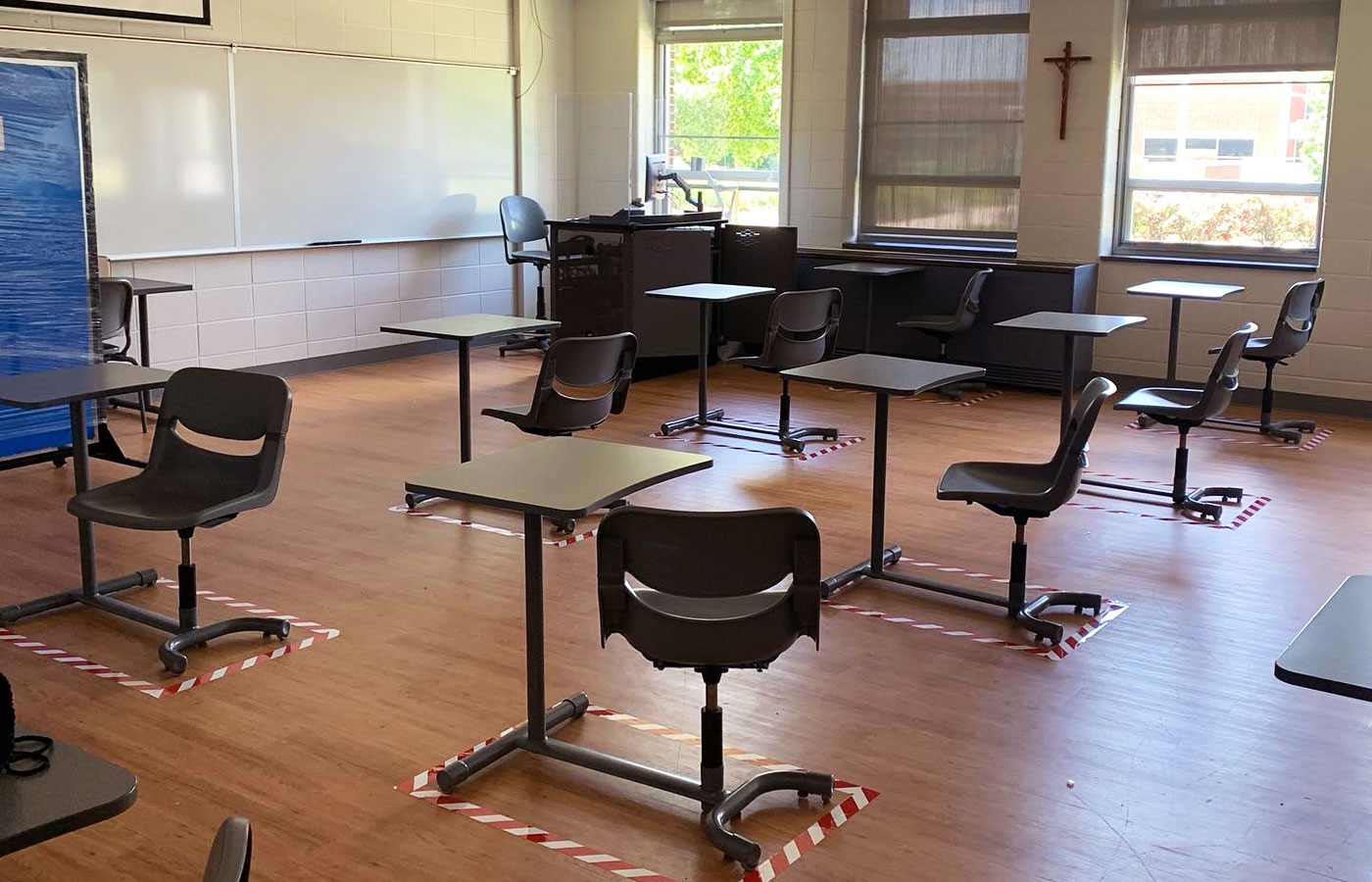News
“By following the rules, we can have a successful semester." Students Return to a COVID-19 Compliant Campus

Signs reminding students to stand six feet apart. Plexiglass partitions dividing dining tables. Sanitizing stations at the entrance of every building. DeSales University students are returning to a new normal on campus.
The campus environment team has been working all summer long to make every building and residence hall COVID-19 compliant. With nearly a million square feet of space on campus, the task was no easy feat.
“Students are going to be as safe here as they are anywhere. You can’t eliminate the risk, but the steps we’ve taken will reduce and mitigate the risk.”
The University has dedicated space inside the Wellness Center in the Dorothy Day Student Union as a special COVID-19 suite—complete with a separate entrance, ventilation system, and UV light sanitation. The suite consists of two rooms—one for testing and an office for alum Alex Knop ’13, DeSales’ newly-hired, dedicated COVID-19 nurse. The suite is also home to the Cepheid GeneXpert, a COVID-19 testing machine that can produce rapid results within just 45 minutes.
“It’s important to have a rapid test to be able to isolate a person who tests positive and to contact those that had exposure to the person and be able to quarantine them,” says Albanese. “The faster you can do that, the quicker you can reduce the replication factor.”
If a student does test positive, the University’s contact tracing team will be implemented immediately to determine who the student had contact with. The team consists of 12 members from various departments across campus. Each member completed the COVID-19 Contact Tracing course developed by the Johns Hopkins Bloomberg School of Public Health, and the team has been meeting bi-weekly throughout the summer.
Any student who contracts COVID-19 will be encouraged to return home and isolate, if it can be done safely. If not, DeSales has set aside two units of the University Heights along with the Fromentin guest house as isolation housing. It’s also reserved 20 rooms at the nearby Homewood Suites, across from the Promenade Shops, for contacts to quarantine. The contact tracing team will be calling or texting both student cases and contacts every day until they recover or their quarantine ends.
“We’re all in this together,” Albanese says. “Students, faculty, and staff all need to follow the rules by wearing face masks and practicing social distancing. By following the rules, we can have a successful semester.”
Other measures being taken include:
- A comprehensive Ready for Anything online guide detailing the steps DeSales is taking to address COVID-19 and keep the campus community safe.
- Students, faculty, and staff are taking the Salesian Solidarity Pledge to maintain social distancing, properly wear a face mask, wash their hands regularly, and monitor their health.
- Students, faculty, and staff must download the HealthChampion app and complete a daily health check before coming to campus or leaving their rooms. The app asks basic questions that screen for COVID-19 related symptoms. Anyone flagged as a possible case will be directed to call DeSales’ COVID-19 hotline.
- Every campus building is outfitted with at least one sanitizing station complete with masks, hand sanitizer, and gloves. Each building also contains a UV sanitizing machine located at the reception desk for students, faculty, and staff to sanitize keys, masks, cell phones, and other small items.
- Classrooms are reconfigured to adhere to social distancing guidelines, and custom-made plexiglass shields are placed on all teaching podiums. UV air purifiers can also be found in classrooms.
- The Wills Hall chapel is converted into a 55-seat socially distanced classroom with flex technology, while conference rooms in the DeSales University Center have been turned into a 75-seat socially distanced classroom.
- Automatic door operators are installed on high-traffic building entrances. Larger buildings have doors designated as either “Enter” or “Exit” to minimize congestion.
- The University has set up a COVID-19 Tip Line to report anyone not following the rules.
- DeSales Dining has rolled out a new mobile ordering app allowing students, faculty, and staff to preorder meals from every food venue on campus. Large tents also are set up outside dining venues to provide additional seating for students.
These preparations are a culmination of the work of the DeSales COVID-19 Contingency Planning Task Force, which has adapted the Johns Hopkins COVID-19 Planning Guide and Self Assessment tool—considered by many to be the exemplar baseline assessment, planning, and reporting tool for higher education. Other notable inputs to our planning process include pulls from the United States Centers for Disease Control and Prevention (CDC), the Pennsylvania Department of Health (PA DOH), and the Occupational Safety and Health Administration (OSHA).





